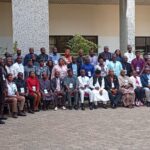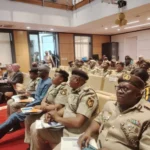By Ebere Agozie
ActionAid Technical Working Group has called for stringent punitive measures against judicial officers who deliberately misuse the application of the law in adjudication.
Ms Adesuwa Iluobe, Coordinator of the ActionAid Citizens’ Led Engagements on Judicial Accountability in Post-Election Justice Delivery in Nigeria (CLEAP-Justice) project, presented the recommendations to newsmen in Abuja.
Iluobe said the interactive session with the media with the theme “Towards Increased Citizens’ Consciousness for a Transparent Judiciary “ was to discuss the gaps within the Acts that necessitate reforms and policy advocacy.
She said: “We equally recommend that the National Judiciary Council (NJC) should be more proactive in the discipline of judges who misuse ex-parte orders and such judges should not be appointed to election tribunals.
“Making disciplinary reports public would deter judges from compromised actions, as they would be aware of the potential public scrutiny.
“Collaboration with identified incorruptible judges should be pursued and comprehensive security and welfare provided to help them withstand external pressure’’.
According to her, the project also recommends enhanced objectivity and transparency in the appointment of judges and throughout the judicial system.
“The process applied by NJC should include citizens’ scrutiny of proposed appointees.
“The establishment of an online platform is needed for citizens to report judicial misconduct or blow the whistle on judges and court proceedings.
“Also, the position of the CJN should be unbundled to reduce the concentration of power and promote transparency.
“There should be deputies to all Heads of Courts, with their roles and responsibilities clearly defined’’.
She said that where there are allegations against the CJN and other Supreme Court justices, Justices of Supreme Court level from other Commonwealth jurisdictions should be involved in the disciplinary process.
She said that CLEAP Justice also recommended a constitution amended to the effect that election litigations for National Assembly and gubernatorial elections should be at two levels.
“The litigation should end at the Court of Appeal, with three-panel members at the lower court and five at the Court of Appeal.
“Also, independent experts on elections in each tribunal should be included to provide opinions.
“In order to ensure completion of Election Petitions before swearing-in, there should be shorter timelines for election petitions from 180 days to a maximum of 120 days or 60 days at each level’’.
“Individuals who have worked with INEC should be restricted from engaging in partisan politics for at least five years after leaving the commission.
“It recommended that efforts should be made to nurture public trust in election processes and outcomes and transparency in the electoral system promoted’’.
Edited by Sadiya Hamza












